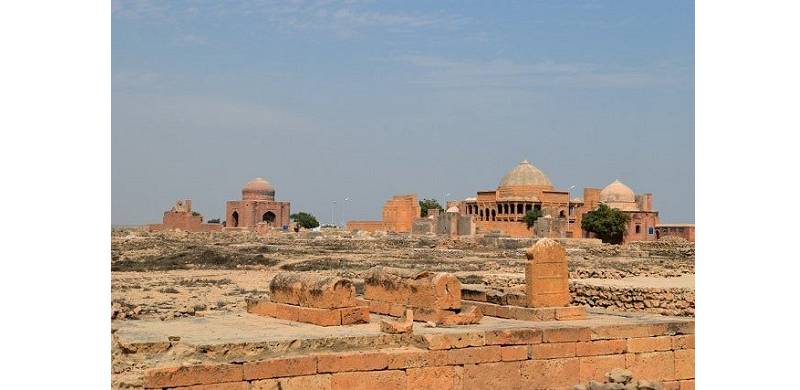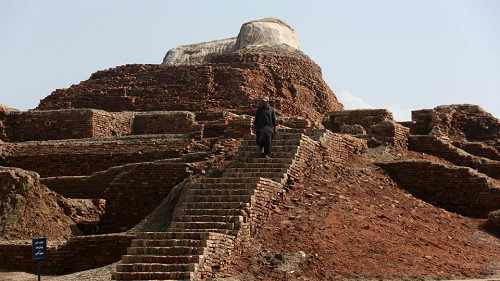
The United Nations Educational, Scientific and Cultural Organisation (UNESCO) in its meeting held in Islamabad on Wednesday has decided to launch a project for protecting the world-famous heritage sites of Sindh-Makli Necropolis and Moenjodaro from the effects of natural disasters. This decision has been taken in the wake of abrupt environmental changes taking place across the world, and South Asia is likely to be profoundly affected more by this phenomenon.
Under the aegis of its World Heritage Centre Emergency Assistance, UNESCO is conducting damage assessment of the World Heritage Sites of Makli and Moenjodaro in Sindh, in collaboration with the Sindh Culture, Tourism, Antiquities and Archives Department. This assessment would help the organisation to form a concrete strategy for safeguarding the sites.
 Heavy rainfall during the monsoon season and subsequent floods played havoc across the country resulting in serious damage to the historical sites of the country as well. UNESCO has marshaled a fund worth $ 350,000 from the World Heritage Emergency Assistance for this special project after the recent visit of UN Secretary-General Antonio Guterres and the Director of UNESCO Islamabad Youssef Filali-Meknassi.
Heavy rainfall during the monsoon season and subsequent floods played havoc across the country resulting in serious damage to the historical sites of the country as well. UNESCO has marshaled a fund worth $ 350,000 from the World Heritage Emergency Assistance for this special project after the recent visit of UN Secretary-General Antonio Guterres and the Director of UNESCO Islamabad Youssef Filali-Meknassi.
In January, Youssef Filali-Meknassi, accompanied by National Project Officer Mariam Farooqi, visited the Makli necropolis in Thatta for an initial assessment of the damages caused by heavy rainfall, and urgent stabilisation measures were carried out by the site management team. Similarly, a team led by UNESCO National Professional Officer Jawad Aziz evaluated post-rain effects on the historical site of Moenjodaro.
The team, after inspecting both sites, developed an opinion that initially it is necessary to make arrangements for removing rainwater from these sites. Standing rainwater would pose a serious threat to the centuries-old structures.
It would be pertinent to mention here that both the sites located in Sindh are part of the UNESCO list of world heritage sites.
Under the aegis of its World Heritage Centre Emergency Assistance, UNESCO is conducting damage assessment of the World Heritage Sites of Makli and Moenjodaro in Sindh, in collaboration with the Sindh Culture, Tourism, Antiquities and Archives Department. This assessment would help the organisation to form a concrete strategy for safeguarding the sites.
 Heavy rainfall during the monsoon season and subsequent floods played havoc across the country resulting in serious damage to the historical sites of the country as well. UNESCO has marshaled a fund worth $ 350,000 from the World Heritage Emergency Assistance for this special project after the recent visit of UN Secretary-General Antonio Guterres and the Director of UNESCO Islamabad Youssef Filali-Meknassi.
Heavy rainfall during the monsoon season and subsequent floods played havoc across the country resulting in serious damage to the historical sites of the country as well. UNESCO has marshaled a fund worth $ 350,000 from the World Heritage Emergency Assistance for this special project after the recent visit of UN Secretary-General Antonio Guterres and the Director of UNESCO Islamabad Youssef Filali-Meknassi.In January, Youssef Filali-Meknassi, accompanied by National Project Officer Mariam Farooqi, visited the Makli necropolis in Thatta for an initial assessment of the damages caused by heavy rainfall, and urgent stabilisation measures were carried out by the site management team. Similarly, a team led by UNESCO National Professional Officer Jawad Aziz evaluated post-rain effects on the historical site of Moenjodaro.
The team, after inspecting both sites, developed an opinion that initially it is necessary to make arrangements for removing rainwater from these sites. Standing rainwater would pose a serious threat to the centuries-old structures.
It would be pertinent to mention here that both the sites located in Sindh are part of the UNESCO list of world heritage sites.

